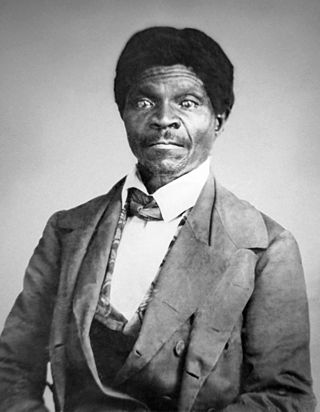
Dred Scott was an enslaved African American man who, along with his wife, Harriet, unsuccessfully sued for the freedom of themselves and their two daughters, Eliza and Lizzie, in the Dred Scott v. Sandford case of 1857, popularly known as the "Dred Scott decision". The Scotts claimed that they should be granted freedom because Dred had lived in Illinois and the Wisconsin Territory for four years, where slavery was illegal, and laws in those jurisdictions said that slave holders gave up their rights to slaves if they stayed for an extended period.
Olivier Le Jeune was the first recorded slave purchased in New France.

The Zong massacre was a mass killing of more than 130 enslaved African people by the crew of the British slave ship Zong on and in the days following 29 November 1781. The William Gregson slave-trading syndicate, based in Liverpool, owned the ship as part of the Atlantic slave trade. As was common business practice, they had taken out insurance on the lives of the enslaved Africans as cargo. According to the crew, when the ship ran low on drinking water following navigational mistakes, the crew threw enslaved Africans overboard.

The Blockade of Africa began in 1808 after the United Kingdom outlawed the Atlantic slave trade, making it illegal for British ships to transport slaves. The Royal Navy immediately established a presence off Africa to enforce the ban, called the West Africa Squadron. Although the ban initially applied only to British ships, Britain negotiated treaties with other countries to give the Royal Navy the right to intercept and search their ships for slaves.

Nathaniel Gordon was an American slave trader who was the only person in the United States to be tried, convicted, and executed by the federal government for having "engaged in the slave trade" under the Piracy Law of 1820.

Abdul Rahman Ibrahima ibn Sori was a Fula prince and Amir (commander) from the Fouta Djallon region of Guinea, West Africa, who was captured and sold to slave traders and transported to the United States in 1788. Upon discovering his lineage, his enslaver, Thomas Foster, began referring to him as "Prince", a title used for Abdul Rahman until his final days. After spending 40 years in slavery, he was freed in 1828 and returned to Africa the following year, but died in Liberia within months of arrival.

Anthony Burns was an African-American man who escaped from slavery in Virginia in 1854. His capture and trial in Boston, and transport back to Virginia, generated wide-scale public outrage in the North and increased support for abolition.
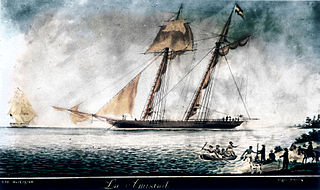
La Amistad was a 19th-century two-masted schooner owned by a Spaniard living in Cuba. It became renowned in July 1839 for a slave revolt by Mende captives who had been captured and sold to European slave traders and illegally transported by a Portuguese ship from West Africa to Cuba, in violation of European treaties against the Atlantic slave trade. Spanish plantation owners Don José Ruiz and Don Pedro Montes bought 53 captives in Havana, Cuba, including four children, and were transporting them on the ship to their plantations near Puerto Príncipe. The revolt began after the schooner's cook jokingly told the slaves that they were to be "killed, salted, and cooked." Sengbe Pieh unshackled himself and the others on the third day and started the revolt. They took control of the ship, killing the captain and the cook. Three Africans were also killed in the melee.

Sherman Miller Booth was an abolitionist, editor and politician in Wisconsin, and was instrumental in forming the Liberty Party, the Free Soil Party and the Republican Party. He became known nationally after helping instigate a jailbreak for a runaway slave in violation of the Fugitive Slave Act.
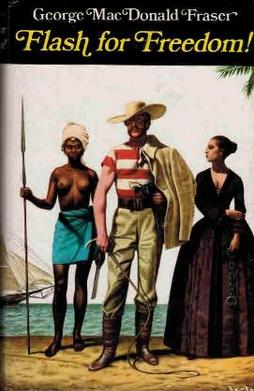
Flash for Freedom! is a 1971 novel by George MacDonald Fraser. It is the third of the Flashman novels.
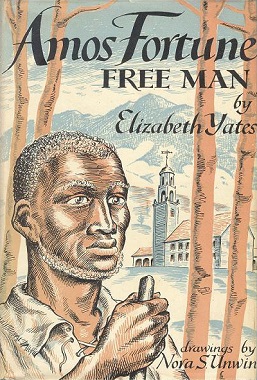
Amos Fortune, Free Man is a biographical novel by Elizabeth Yates that won the Newbery Medal for excellence in American children's literature in 1951. It is about a young African prince who is captured and taken to America as a slave. He masters a trade, purchases his freedom and dies free in Jaffrey, New Hampshire, in 1801.
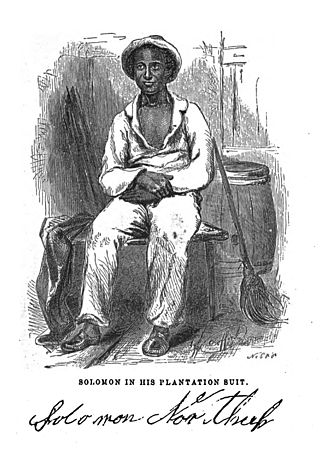
Twelve Years a Slave is an 1853 memoir and slave narrative by Solomon Northup as told to and written by David Wilson. Northup, a black man who was born free in New York state, details himself being tricked to go to Washington, D.C., where he was kidnapped and sold into slavery in the Deep South. He was in bondage for 12 years in Louisiana before he was able to secretly get information to friends and family in New York, who in turn secured his release with the aid of the state. Northup's account provides extensive details on the slave markets in Washington, D.C., and New Orleans, and describes at length cotton and sugar cultivation and slave treatment on major plantations in Louisiana.

Slavery was practiced in Massachusetts bay by Native Americans before European settlement, and continued until its abolition in the 1700s. Although slavery in the United States is typically associated with the Caribbean and the Antebellum American South, enslaved people existed to a lesser extent in New England: historians estimate that between 1755 and 1764, the Massachusetts enslaved population was approximately 2.2 percent of the total population; the slave population was generally concentrated in the industrial and coastal towns. Unlike in the American South, enslaved people in Massachusetts had legal rights, including the ability to file legal suits in court.

Buud Yam is a 1997 Burkinabé historical drama film written and directed by Gaston Kaboré. It is the sequel to the film Wend Kuuni. As of 2001, it was the most popular African film ever in Burkina Faso.
Bouka is a 1988 drama film directed by Roger Gnoan M'Bala.
Souheil Ben-Barka is a Moroccan film director, screenwriter and film producer. He directed seven films between 1974 and 2002. His 1975 film La guerre du pétrole n'aura pas lieu was entered into the 9th Moscow International Film Festival. His 1983 film Amok won the Golden Prize at the 13th Moscow International Film Festival. In 1987 he was a member of the jury at the 15th Moscow International Film Festival.
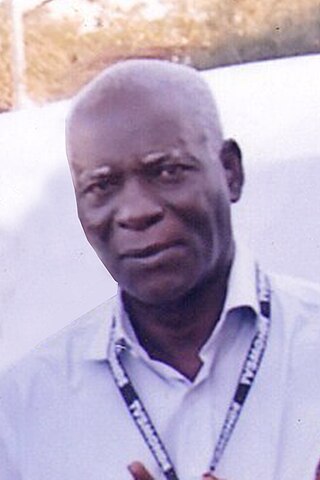
Roger Gnoan M'Bala was an Ivorian film director.

Olivier Barlet is a French journalist, translator, film critic and researcher on African cinema and its diasporas.
José Augusto Octávio Gamboa dos Passos, known as Zézé Gamboa is an Angolan film director.















